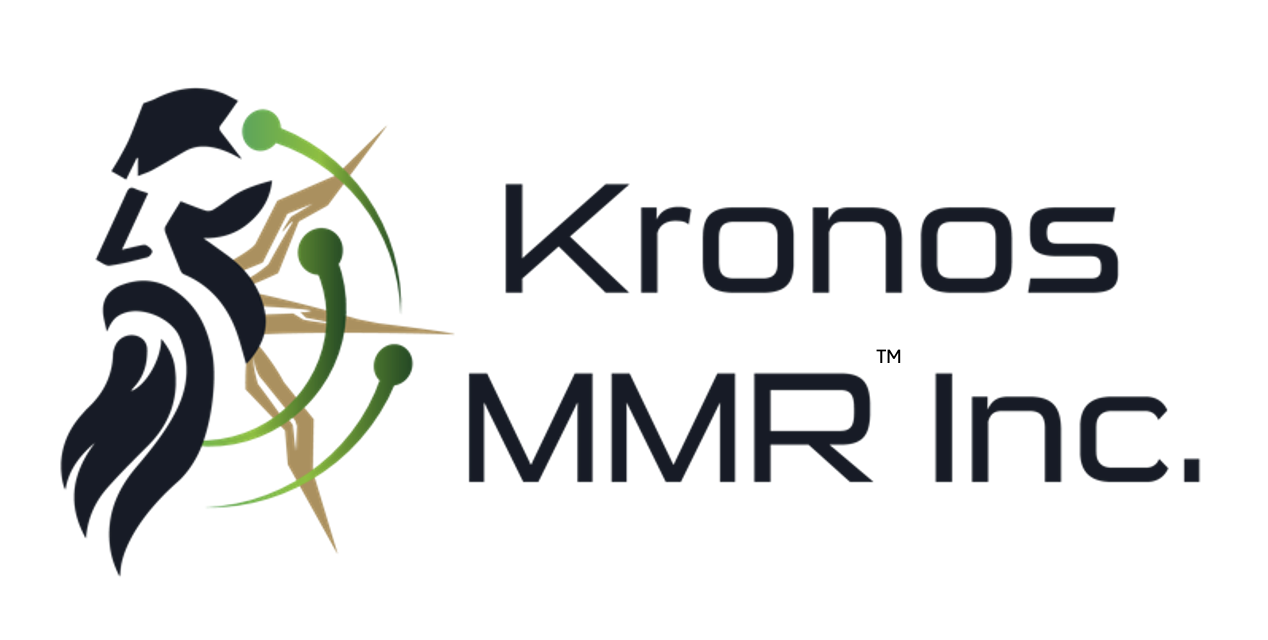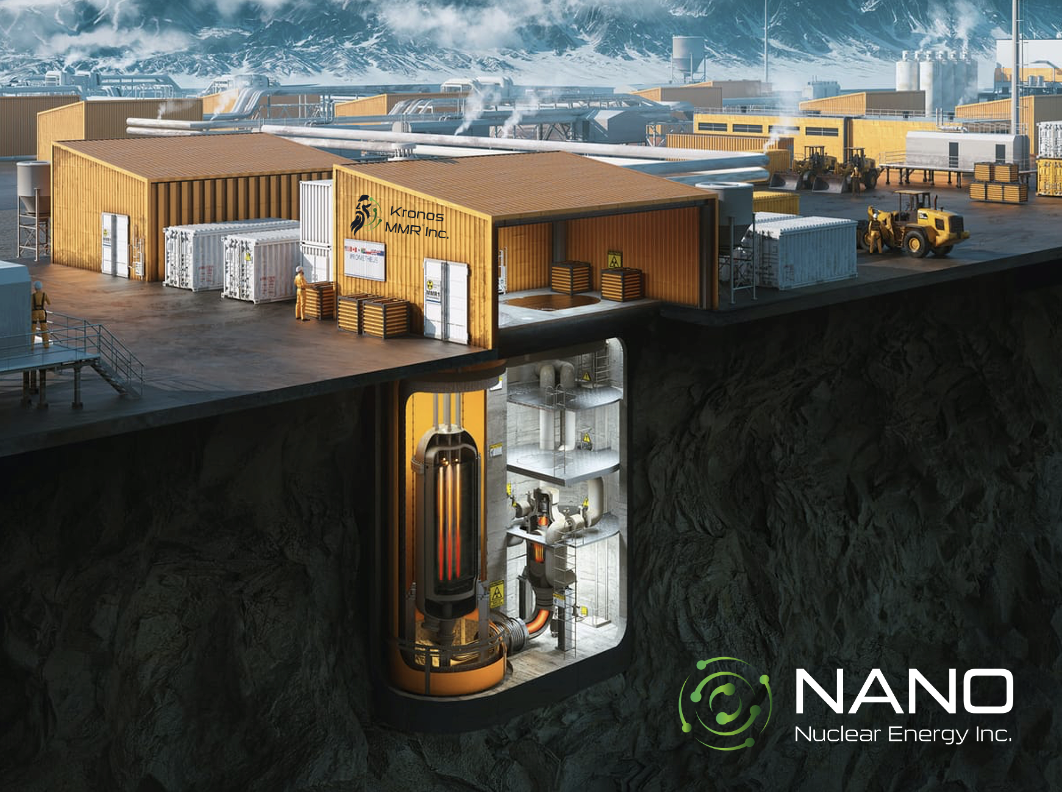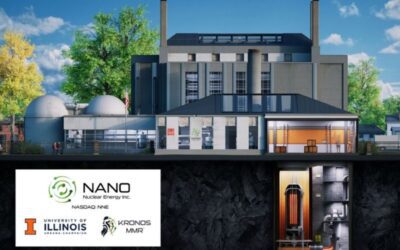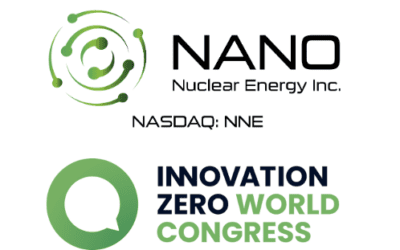NANO Nuclear Energy Inc. (NASDAQ: NNE) (“NANO Nuclear” or “the Company”), a leading advanced nuclear energy and technology company focused on developing clean energy solutions, today announced the rebranding of its recently acquired, patented Micro Modular Reactor (MMR®) Energy System, which will now be known as KRONOS MMR™.
Figure 1 – NANO Nuclear Energy Designates its Newly Acquired and Patented Energy System as KRONOS MMRTM
Designed as a stationary small modular nuclear reactor capable of delivering carbon-free electricity and high-quality process heat for co-located industrial applications and high-efficiency hydrogen production, KRONOS MMR™ complements NANO Nuclear’s proprietary microreactor technologies, ‘ZEUS’ and ‘ODIN’ as well as the recently acquired Pylon reactor, each currently under development. With a compact footprint of less than 5 acres, KRONOS MMR™ is designed to operate flexibly at power levels ranging up to 45 MWt (15 MWe) and can utilize either low-enriched uranium (LEU) or high-assay low-enriched uranium (HALEU).
The acquisition of KRONOS MMR™ specifically will enable NANO Nuclear to serve a broader range of growing markets that have high energy demands, including large-scale data and artificial intelligence centers and other energy-intensive operations in manufacturing and infrastructure.
Figure 2 – Rendering of NANO Nuclear Energy’s Newly Acquired Patented KRONOS MMRTM Energy System.
“NANO Nuclear is pleased to announce the rebranding of the KRONOS MMR™ Energy System following its acquisition from Ultra Safe Nuclear,” said Jay Yu, Founder and Chairman of NANO Nuclear Energy. “This technology has undergone extensive development at the Canadian Nuclear Laboratories in collaboration with Ontario Power Generation, as well as at the University of Illinois at Urbana-Champaign. It was also the first small modular reactor to enter the formal licensing review phase with the Canadian Nuclear Safety Commission, reflecting its progress in design and development. We are committed to continuing this technology’s journey toward regulatory licensing and ultimately commercialization and supporting all ongoing demonstration and regulatory efforts.”
Pending Canadian governmental approvals of the acquisition, further demonstrations of the KRONOS MMR™ are expected to take place at the Canadian Nuclear Laboratories (CNL). Prior to its acquisition, the MMR® was chosen by the CNL to be sited at Chalk River Laboratories as part of the Global First Power (GFP) initiative, which aims to construct and operate Canada’s first microreactor. KRONOS MMR™ is the first small modular reactor to enter the Canadian Nuclear Safety Commission’s formal licensing review.
NANO Nuclear plans to extend an existing KRONOS MMR™ collaboration with the University of Illinois at Urbana-Champaign with the aim of demonstrating the reactor’s high technology readiness level at the University. In parallel, NANO Nuclear will continue the MMR® licensing process with the U.S. Nuclear Regulatory Commission. Furthermore, NANO Nuclear plans to explore additional strategic collaborations and complementary agreements to support the efficient advancement of the technology. These efforts are aligned with NANO Nuclear’s broader mission to deliver innovative, reliable, and carbon-free nuclear energy solutions to meet the needs of modern industries and communities.
“The integration of the KRONOS MMR™ energy system into our portfolio enhances our ability to address critical market demands, including the growing energy requirements for data centers and artificial intelligence applications,” said James Walker, Chief Executive Officer and Head of Reactor Development of NANO Nuclear Energy. “Its acquisition aligns with our strategy of securing pivotal technologies that strengthen our position in the advanced nuclear technology sector. With its advanced stage of development, KRONOS MMR™ enables us to significantly accelerate our deployment timeline while avoiding substantial development costs. Additionally, it enhances the robustness of our offerings, allowing us to deliver more tailored and efficient energy solutions to industries currently dependent on polluting and inefficient energy sources. By integrating this cutting-edge system into our portfolio, we believe we will be better equipped to address the particular energy needs of customers across sectors such as data centers, artificial intelligence applications, and remote industrial operations, all while supporting the transition to cleaner, more sustainable energy alternatives.”
Related Articles
NANO Nuclear Energy Launches Recruitment Drive to Build Full-Scale KRONOS MMR Reactors
NANO Nuclear Aims to Expand Engineering and Project Development Team to Support U.S. and Canadian KRONOS MMR Energy System Reactor Construction and Licensing Efforts Nano Nuclear Energy Inc. (NASDAQ: NNE) (“NANO Nuclear” or the “Company”) is launching a recruitment...
NANO Nuclear Announces Sponsorship and Executive Speaking Engagements at the Upcoming Innovation Zero World Congress 2025 on April 29-30th in London
NANO Nuclear Energy Inc. (NASDAQ: NNE) (“NANO Nuclear” or “the Company”), a leading advanced nuclear energy and technology company focused on developing clean energy solutions, today announced its sponsorship of the Innovation Zero World Congress 2025, to be held on...





